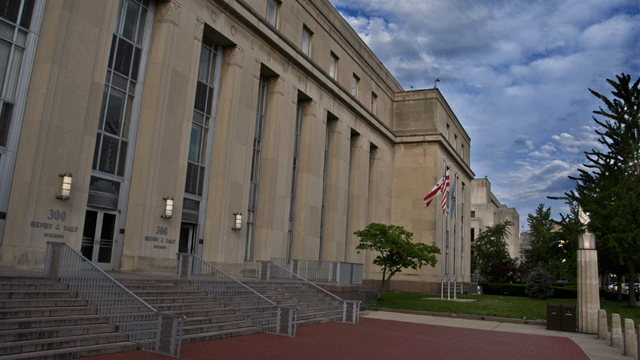
The headquarters of the D.C. Metropolitan Police Department (D.C. Metropolitan Police Department)
Gun owners and gun-rights advocates are fired up over a zoning change by the District of Columbia that paves the way for the only licensed gun dealer in the nation's capital -- forced to shutter his business when he lost his lease -- to re-open inside police headquarters.
The 2008 Supreme Court case that ended the district's long-standing handgun ban made it possible for D.C. residents to buy and own handguns as long they're registered and kept at home. But federal law prohibits residents who buy a handgun in another state from bringing it into the city on their own, instead requiring a licensed dealer to make the transfers for residents.
The district has been without a federally licensed dealer since April, when Charles W. Sykes Jr., the only person in the district licensed to transfer and register handguns purchased in another state, lost his lease. Sykes has had trouble finding an affordable location that also meets the city's zoning rules requiring gun-related businesses to be at least 300 feet away from schools, libraries, playgrounds and other locations.
"The problem is the D.C. gun market is small," said D.C. City Councilman Phil Mendelson. "Mr. Sykes was only processing six-to-10 handguns a month."
Mendelson endorsed the zoning change to help re-establish a federal firearm licensee (FFL) dealer in the district. The change was requested by D.C. Mayor Vincent Gray to the city’s zoning commission.
"Mayor Gray submitted the emergency proposal to the zoning commission to provide a way for Mr. Sykes to set up at Metropolitan Police headquarters in a matter of days should he so choose, and that proposal was approved," a Gray spokesman told FoxNews.com.
D.C. is the first city in the nation to allow a licensed gun dealer to register and process gun sales in a police facility. It is uncertain whether Sykes has decided whether to re-open his shop, CS Exchange, inside police headquarters. He did not respond to requests for comment.
The lease would be a mere $100 a month, though officials did not say whether that compared favorably to other private vendors like food establishments that rent space in city buildings.
But not everyone is satisfied with the new plan.
"D.C. is still trying to tap dance on the lack of gun ban with a monopoly on gun transactions," said Alan Gottlieb, founder of the Second Amendment Foundation, a gun-rights group. "They can't get over the fact that they lost" the Supreme Court case, he said.
Amanda Welling, who lives in the district with her husband and infant son, said she believes the zoning change is just another roadblock to being able to buy a gun in the community in which she lives.
"Now more than ever, I want a gun for home protection," she said. "Our apartment building has been broken into a few times, and when I found out that legally we couldn't receive a handgun here in the district, I was pretty angry. I should be able to buy a gun where I live, and not be hassled with the extra time and cost of using a middle man."
Alan Gura, an attorney representing Welling and other residents who sued the district to make it easier for gun stores to open, says the city's anti-gun policies and zoning restrictions amount to a "de-facto re-imposition of the D.C. handgun ban." The case was dismissed in U.S. District Court in Alexandria, Va., last week, but will be appealed, Gura said.
"People are constitutionally allowed to buy and sell guns; there should be nothing to stop them," Gura said. "The city council has made it virtually impossible to open a gun store with ridiculous zoning laws."
Mendelson disputes that claim, and notes that the dealership would be located in the same place as the registration office.
"If anything, the prospects look to be easier for anyone who wants to acquire a handgun for self protection in their home. Everything will be in the same building, and that will relieve some of the pressure of the backlog dating back to April."
In the meantime, until Sykes decides to set up shop inside the Metropolitan Police Department headquarters, nobody can register a gun, a Gray administration official acknowledged. Mendelson expressed concerns that if a licensed gun dealer doesn't re-open soon, Congress could move to rewrite the district's gun laws.
"Congress could use the lack of a functioning FFL to step in and make wholesale changes to our gun laws," said Mendelson, who opted not to introduce a bill he wrote that would have created a city agency to act as a licensed gun dealer.





















